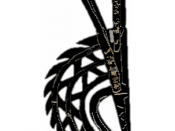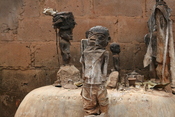Fon is spoken by over half the people of Benin and it is the mother tongue of voodoo. In Fon the root word for voodoo is vodoun that means spirit or god. Voodoo had its origins over 350 years ago in West Africa. In fact Allada, a small town in Benin, is often called the 'cradle of voodoo'. In 1996, January 10th became National Voodoo Day in honor of its followers that make up 65% of Benin population.
The religion Vodoun was a by-product of the slave trade. This Yoruban religion was carried to Haiti in a slave trade from Dahomey, which is currently called Benin. Once in Haiti, the slaves were forced to adopt Catholicism. Desiring to keep their native practices, the slaves continued to perform their rituals in private. They transposed Catholic saints onto the tribal deities, called loa, to please their owners. Instead of hindering the faith of the slaves, the incorporation of the saints added something new to their religion.
Because of this they included into their rituals statues of the saints, candles, and other Christian relics. It is combinations like this that form religions such as Santeria, a blend of Voodoo and Spanish Catholicism, that proves what a malleable religion it is. Voodoo has spread throughout the world into major communities on Rio de Janeiro, New Orleans, Miami, and New York city. Vodoun has as many as 50 million followers throughout the world now.
Although varieties of this religion occur in different regions there are some basic tenets common among them. They all believe that the pulse of life resides in nature's elements like fire or wind. This force is also in union with the dead and thus fosters a belief that they should be respected through rituals. They believe that all things...


